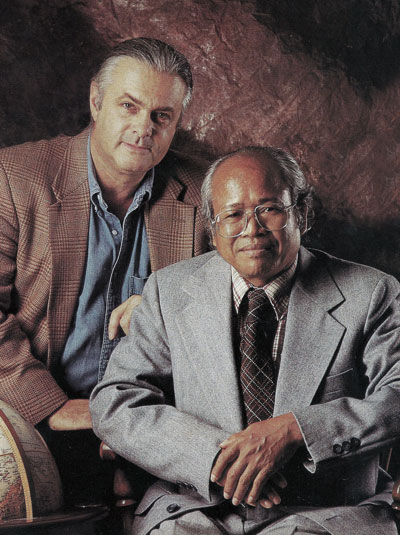
Ken McCullough and U Sam Oeur in 1992
U SAM OEUR is a Cambodian poet, born in 1936, who survived four years in Pol Pot’s concentration camps by feigning illiteracy and by destroying the manuscripts of his literary work. Since he had been raised on a farm, he was able to adapt to the brutal rigors of forced agricultural labor.
“Sam,” as he is known in the U.S., grew up in rural Svey Rieng province, studied in Phnom Penh, and was eventually educated in the U.S., receiving a B.A. in Industrial Arts from Cal State-Los Angeles and an M.F.A. in Poetry from the Iowa Writers Workshop. Sam and I were classmates at Iowa from ’66-’68 and had adjacent apartments for a time. We became close friends. It was my plan to eventually travel to Cambodia and work with Sam in translating Cambodian folk tales into English. These were particularly chaotic years at Iowa, or anywhere else for that matter, and Sam’s pacific nature was one of my primary anchors to sanity during those days.
Sam returned to Cambodia in ’68 as soon as he finished his degree, married, taught for a short time, then entered light industry in several managerial positions. We corresponded until 1970 when Sam informed me that there was little point in writing anymore as all the mail was being censored by the government. I heard nothing from or about him until fourteen years later, when I learned that he volunteered as a captain in the army for two years (’70-’72), then returned to continue working his way up the managerial ladder of Cambodian industry. He was elected a member of Parliament and was selected as a delegate to the U.N. And he continued to write poetry. Then, in April ’75, the Khmer Rouge took over. Sam, his wife, son and mother-in-law were herded from their home and spent the next four years in a succession of six concentration camps. Somehow they all survived. At one point during this period, though, Sam’s wife gave birth to twins who were strangled by midwives at the order of the camp overseer- they were not only extra mouths to feed, but were the cause of a worker being out of circulation. Finally, after the Vietnamese ran off the Khmer Rouge, Sam and his family returned to Phnom Penh and he began to work in the Ministry of Industry.
I learned of his situation when the English Department at the University of Iowa received a letter from Sam, via an Australian non-governmental organization, asking for a copy of his thesis which he’d had to destroy at the outset of the Pol Pot takeover. A secretary in the department had heard me talking about Sam in the past (but never in the past tense), and passed on a copy of his letter.
“Across Three Wildernesses” Movie
Through the Australian connection, Sam and I resumed our correspondence. Immediately I started trying to figure ways of getting Sam out of Cambodia. I asked Clark Blaise, Director of the International Writing Program at Iowa, if he could invite Sam as a participant. When Clark began looking for backing from foundations, however, their response in general was to balk because Sam was not yet considered a big enough literary "fish." (Of course if he had been an established writer, he would have been killed long ago.) Then in 1991, a co-worker of Sam’s discovered in Sam’s desk a poem critical of the Vietnamese-backed regime, which to the co-worker indicated that Sam was involved in the pro-democracy movement in Cambodia. He turned U Sam Oeur in.
But, although this was indeed his leaning, Sam was not actively involved in anything organized. Nevertheless, the Party forced him to sign a letter of resignation from his position with the Ministry of Industry. There was a mood of desperation in his letters to me at this time. Then, luckily, Clark was able to get the Dashiell Hammett-Lillian Hellman Foundation Fund For Free Expression to sponsor Sam as a participant in the program. When in September of 1992 I went to meet Sam at the airport I saw a badly-shaken but no less radiant version of my old friend. Initially, we did not know whether Sam could stay in the U.S. beyond his three-month gig as a fellow in Iowa’s International Writing Program; but eventually we were able through the English Department to get him designated as an Independent Scholar and thereby have his visa extended. In any case, during his three months in the program we worked furiously to translate his work. Sam had arrived with very little down on paper-just a few tattered scraps, so most of what he was coming up with was from memory.
We began to circulate the translations of his poetry and to give bilingual presentations.Editors of magazines and journals began to accept his work for publication, realizing its uniqueness and importance. Allan Kornblum, publisher of Coffee House Press, generously agreed to publish a bilingual edition of Sam’s poetry, Sacred Vows, in 1998, and a memoir, Crossing Three Wildernesses, in 2005. Sam continues to be in demand as a reader.
After much time and effort he is now a US citizen, as is his wife Syna. At present, he lives in McKinney, Texas, near his son and daughter-in-law and five grandchildren. He is translating Whitman’s “Song of Myself” into Khmer.
—Ken McCullough
Works
Crossing Three Wildernesses: A Memoir
Ever Hopeful (poetry by U Sam Oeur)
Selections from Sacred Vows (poetry)
Walt Whitman’s “Song of Myself” Parts 1-8 and “I Hear America Singing” (poetry)
